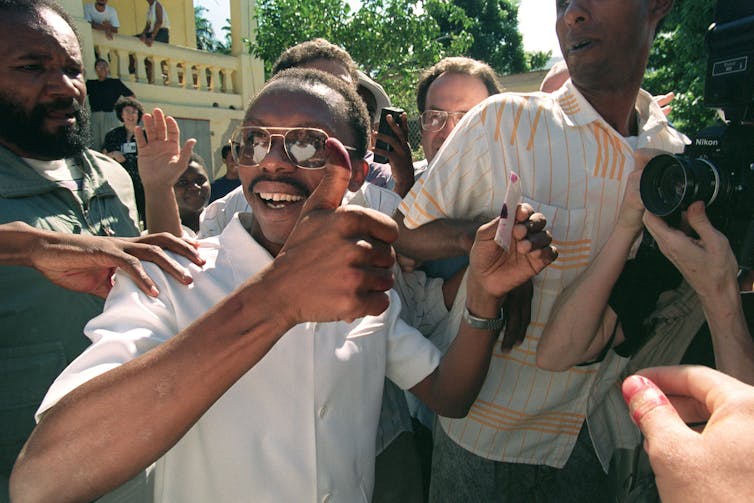Who's running Haiti after president's assassination? 5 questions answered
- Written by Patrick D Bellegarde-Smith, Professor Emeritus of Africology, University of Wisconsin-Milwaukee
Two men are vying to control Haiti after President Jovenel Moïse’s July 7 assassination, creating more turmoil for a nation in crisis. Here, scholar Patrick Bellegarde-Smith, a Haitian studies scholar and author of “Haiti: The Breached Citadel[1],” explains the unusual situation that gave rise to this power struggle – and asserts that Haiti may never get the democracy it needs.
1. Who is running Haiti right now?
Prime Minister Claude Joseph has assumed power. However, Joseph was only an acting prime minister. Appointed by President Moïse in April 2021 on an interim basis, he was supposed to have been replaced on July 7, 2021, by Dr. Ariel Henry, a former interior minister and neurosurgeon[2]. The day before the transition was to happen, the president was assassinated.
Both claim they are the legitimate prime minister. But neither Joseph nor his would-be successor as prime minister have been approved by the Haitian legislature, a necessary step, because there is no functioning Haitian legislature at the moment. Lawmakers’ terms of office ended in January 2020[3] and President Moïse never held legislative elections to elect new lawmakers, as called for by statute.
So the country has been operating without a parliament for the past 18 months. Moïse ruled by decrees[4] – “decret-lois” – that did not require legislative approval. In the U.S., executive orders would be a close parallel.
 Acting Haitian Prime Minister Claude Joseph at a press conference at his residence in Port-au-Prince on July 8, 2021.
Getty Images/Getty Images News via Getty Images[5]
Acting Haitian Prime Minister Claude Joseph at a press conference at his residence in Port-au-Prince on July 8, 2021.
Getty Images/Getty Images News via Getty Images[5]
2. Who is officially supposed to replace the president of Haiti if he dies or becomes incapacitated?
For long stretches of its history, the Haitian Constitution named the president of the Cour de Cassation – chief justice of the Haitian supreme court – as first in the line of succession, followed by all other judges of the high court, based on seniority.
The Constitution of 1987[6] was amended to say that the prime minister would become the transitional chief of state – but only after he had been ratified by both houses of the legislature, comprising the Chamber of Deputies and the Senate.
Well, Haiti’s legislature is not in operation right now. You have only 10 sitting senators out of 30, and no deputies left. So the constitutional provision cannot be applied. And the president of Haiti’s high court died of COVID-19 in June 2021.
This is the thing that’s most worrisome to me: Whatever the Constitution provides for at the moment cannot happen.
3. What is the US government’s position on Haiti’s leadership crisis?
The U.S. helped create the situation by its continued support of President Moïse, who had become despised by many Haitians[7] even before he overstayed his four-year term. After his 2016 election, Moïse quickly lost all credibility because of a corruption scandal, with all sectors of the Haitian population – its small political elite class, the wealthy, the middle classes and the broad peasantry.
But former President Donald Trump liked Moïse. President Biden supported his administration, too, but hasn’t paid much attention to Haiti – until now. So far, the U.S. has denied a request from Haiti’s interim prime minister to send troops “to assist and help us[8].”
The U.S. has also called for national elections to be held by the end of the year[9], as scheduled – as if “democracy” means only elections. The definition of democracy in the U.S. is very instrumental: Either you have an election or don’t you have an election, so you’re either a democracy or you aren’t.
It’s not as simple as that. Democracy is a process.
4. So what would a Haitian democratic process look like?
Haitians have always sought democracy.
After all, Haiti was the first country the world to abolish slavery. Fourteen days after declaring independence from France, in 1804, the Haitian chief of state Jean-Jacques Dessalines[10] declared Haiti would provided refuge and guaranteed freedom for all and any Black persons who reached its shores[11]. Dessalines was soon killed.
What modern Haitians want is democracy – that’s “Haitian democracy, not American democracy,” to quote a peasant woman speaking to a reporter in 1987[12].
But what Haitians want has been ignored since 1915, the last time a Haitian president was assassinated. That opened the door for a brutal 19-year U.S. military invasion and occupation[13]. Even before 1915, there were 19 U.S. military interventions in Haiti[14], and many more since.
It’s the rare Haitian president who can be elected without the consent of the United States, and none survive without Washington’s support[15]. Several presidents elected by Haitians have been overthrown with the U.S. government’s help[16].
One was President Jean-Bertrand Aristide[17], a Roman Catholic priest from the slums, who was elected in 1990. Poor Haitian people, the majority, massively voted for him, and he brought people like them – the peasants, the urban working classes – into power. This horrified the Haitian middle and upper classes.
 Haitian presidential candidate Jean-Bertrand Aristide after voting in Haiti’s 1990 presidential election, Dec. 16, 1990. Aristide won in a landslide.
JEROME DELAY/AFP via Getty Images[18]
Haitian presidential candidate Jean-Bertrand Aristide after voting in Haiti’s 1990 presidential election, Dec. 16, 1990. Aristide won in a landslide.
JEROME DELAY/AFP via Getty Images[18]
Aristide was overthrown by the Haitian army[19] seven months into office. He later returned to power and was overthrown again[20] – a coup he says was U.S.-backed[21]. The U.S. denies involvement.
5. What does so much foreign intervention in Haiti’s history mean for its future?
If Haiti is to have a real representative democracy, the Haitian power structure must reflect the culture of the Haitian people. That may take a revolution – and with the U.S. engagement there, that’s unlikely to happen.
One moment in which this process began to occur[22] was the 1987 constitution, which was published in both Creole and in French. Voted on in a referendum, it passed with stunning popular approval.
In several moves aimed at removing colonial influence, the new constitution made Haitian Creole an official language of Haiti and removed Catholicism – the French faith – as the state religion. It also decriminalized the Haitian religion Vodou[23].
[Over 100,000 readers rely on The Conversation’s newsletter to understand the world. Sign up today[24].]
The changes mandated by the new constitution are very much still in progress. Ninety-five percent of Haitians do not speak a lick of French – but the schools overwhelmingly teach in French. Until recently the courts and the legislature conducted all their business in French. This means the people don’t know what’s going on in their country.
If the state institutions do not reflect the country’s culture, then a country can never be democratic.
References
- ^ Haiti: The Breached Citadel (www.abebooks.com)
- ^ Dr. Ariel Henry, a former interior minister and neurosurgeon (www.miamiherald.com)
- ^ terms of office ended in January 2020 (www.economist.com)
- ^ Moïse ruled by decrees (theconversation.com)
- ^ Getty Images/Getty Images News via Getty Images (www.gettyimages.com)
- ^ Constitution of 1987 (pdba.georgetown.edu)
- ^ despised by many Haitians (theconversation.com)
- ^ to assist and help us (www.washingtonpost.com)
- ^ national elections to be held by the end of the year (www.state.gov)
- ^ Jean-Jacques Dessalines (theconversation.com)
- ^ guaranteed freedom for all and any Black persons who reached its shores (theconversation.com)
- ^ speaking to a reporter in 1987 (www.abebooks.com)
- ^ 19-year U.S. military invasion and occupation (theconversation.com)
- ^ interventions in Haiti (time.com)
- ^ survive without Washington’s support (www.nytimes.com)
- ^ U.S. government’s help (archive.nytimes.com)
- ^ President Jean-Bertrand Aristide (www.britannica.com)
- ^ JEROME DELAY/AFP via Getty Images (www.gettyimages.com)
- ^ was overthrown by the Haitian army (www.nytimes.com)
- ^ was overthrown again (www.ijdh.org)
- ^ he says was U.S.-backed (www.cnn.com)
- ^ this process began to occur (www.cidh.org)
- ^ the Haitian religion Vodou (theconversation.com)
- ^ Sign up today (theconversation.com)
















